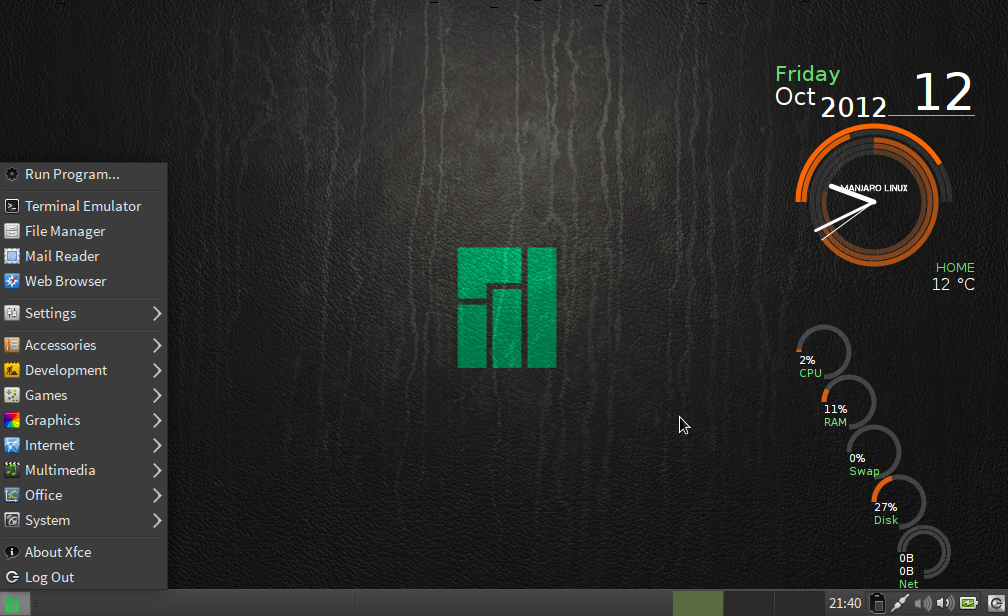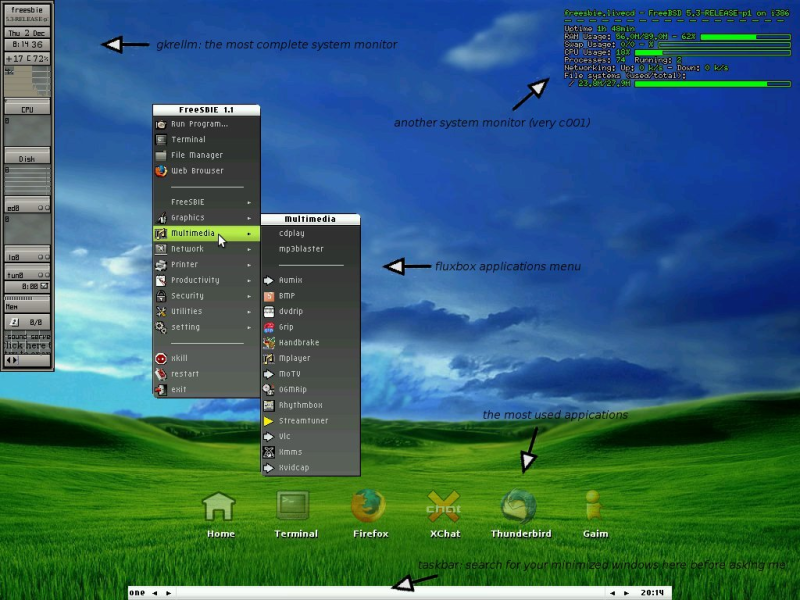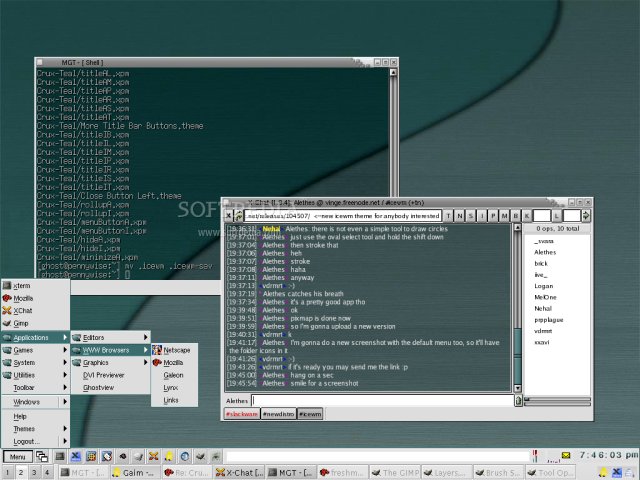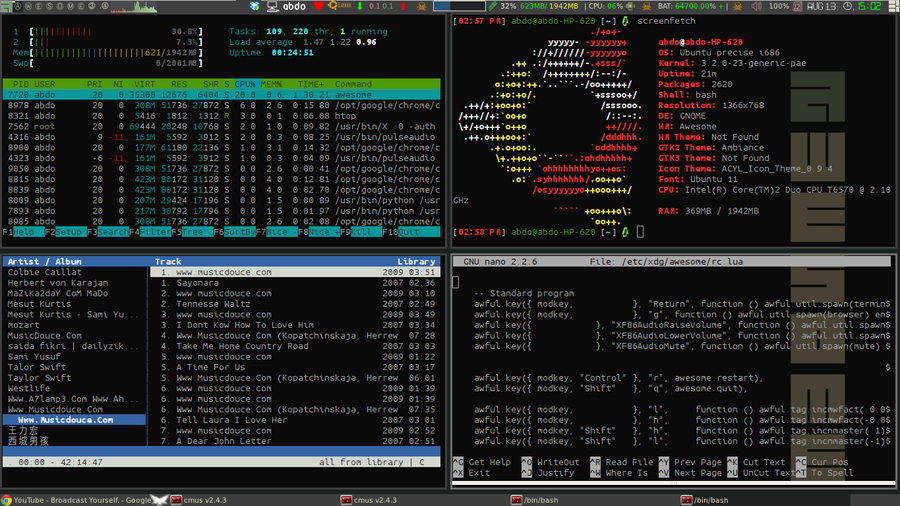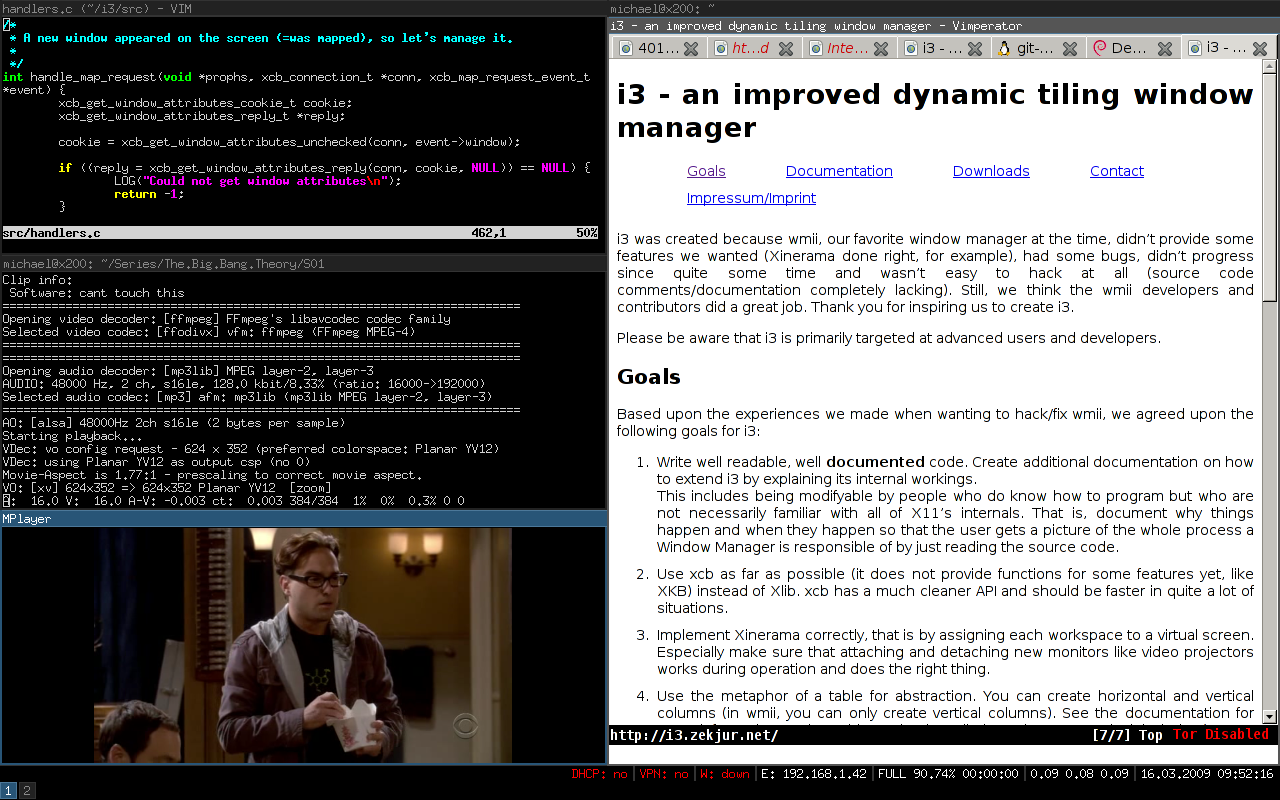Install Desktop Environments
Views
Actions
Namespaces
Variants
Tools
Overview
There are several Desktop Environments and Window Managers available for Manjaro, each with their own unique style, interface, and features. Furthermore, it is possible to install multiple environments if desired, which can be selected at the login screen at any time. Users are not restricted to whatever comes pre-installed with a particular flavour of Manjaro.
Desktop Environments
It is worth noting that a desktop environment is not a single entity; it is actually a collection of different components that work together. This commonly includes a:
- window manager to display, move and resize application windows
- file manager to visually browse, copy and access files, etc.
- background provider to display wallpapers, etc.
- panel to provide a menu and to display information such as the time
- settings/configuration manager to change the look of the environment
And so on. Most desktop environments will also come with their own preferred applications, in addition to various widgets, addons, and extensions to provide extra features. As such, upon entering the commands provided below in your terminal to download and install a desktop environment, you may be prompted to choose from a selection of components provided for it. To install a full desktop environment - complete with its own preferred file manager, applications, and so on - simply press <enter> when prompted. Everything will be downloaded and installed by default.
Where additional (and optional) extras for a desktop environment are availble, the terminal commands to obtain these have also been provided. These commands have been listed seperately to those for obtaining the desktop environments themselves.
XFCE
XFCE is a lightweight and versatile desktop environment that utilises a classic drop-down or pop-up menu to access applications. It is also compatible with Compiz. Although highly configurable, XFCE does provide a somewhat basic interface that may lack some modern features expected (such as, no built-in search bar in the menu). A little time and effort will also be required to properly customise the desktop to suit personal taste. A 64 bit installation of Manjaro running XFCE uses about 200MB of memory. To install XFCE, enter the command:
sudo pacman -S xfce4
To install extra themes, desktop backgrounds, and panel items (widgets), enter the command:
sudo pacman -S xfce4-goodies
KDE
KDE is a feature-rich and versatile desktop environment that provides several different styles of menu to access applications. It is also compatible with Compiz. An excellent built-in interface to easily access and install new themes, widgets, etc, from the internet is also worth mentioning. While very user-friendly and certainly flashy, KDE is also quite resource heavy and noticably slower to start and use than a desktop environment such as XFCE. A 64 bit installation of Manjaro running KDE uses about 550MB of memory. To install KDE, enter the command:
sudo pacman -S kde kdeplasma-applets-plasma-nm
If you want to install the old networkmanagement applet, enter the command:
yaourt -S kdeplasma-applets-networkmanagement
Gnome 3
Gnome 3 is an intuitive desktop environment that utilises a tablet or smartphone style interface to access applications. It is not compatible with compiz. Although Gnome is very easy to learn and use, its customisation options are quite limited, and it can be difficult to configure. A 64 bit installation of Manjaro running Gnome uses about 220MB of memory. To install Gnome, enter the command:
sudo pacman -S gnome
To install extra themes, games, and features, enter the command:
sudo pacman -S gnome-extra
Cinnamon
Cinnamon is a desktop environment based on Gnome 3 that utilises a large panel-style menu to access applications. It is not compatible with compiz. Despite being based on Gnome, it has more customisation options and is easier to configure. Users of Windows Vista or Windows 7 may find Cinnamon's interface comfortably familiar. A 64 bit installation of Manjaro running Cinnamon uses about 350MB of memory. To install Cinnamon, enter the command:
sudo pacman -S cinnamon
If you are installing Cinnamon alone on the NET Edition, then it is essential to install a terminal as well, as one will not be provided with Cinnamon by default. The command to install the Gnome terminal is:
sudo pacman -S gnome-terminal
Razor-QT
Razor-QT is a lightweight desktop environment still under development. It has no window manager of its own, although it can be configured to use Compiz as such (not using the Fusion-Icon, however). It is designed with lower-end computers in mind. At its current stage of development, Razor-QT may not be suitable for all users. A 64 bit installation of Manjaro running Razor-QT uses about 300MB of memory. To install Razor-QT, enter the command:
sudo pacman -S razor-qt
To install the recommended Window Manager, use USB devices, and shutdown/reboot from Razor-QT, enter the command:
sudo pacman -S openbox upower udisks
LXDE
LXDE is a super-lightweight desktop environment that is very similar to XFCE, with the exception that it is not compatible with Compiz. As with XFCE, LXDE is also a somewhat basic desktop environment, lacking some modern features that would be expected, such as a search-bar to find applications and files. However, it is also an excellent choice for less powerful computers, as a 64 bit installation of Manjaro running LXDE uses only about 150MB of memory. To install LXDE, enter the command:
sudo pacman -S lxde
Window Managers
Although Desktop Environments commonly provide a good range of customisation options to suit personal taste and preference, they may still be seen as somewhat restrictive or controlled in the sense that they merely allow for the personalisation of their pre-defined components. However, certain Window Managers empower users to take a 'do it yourself' approach in order to create their own desktop environments. In essence, they may be used as a foundation on which to build upon, as literally every component and every aspect of the desktop is under the direct control and choice of the user. An environment may be as elaborate or as minimalistic as desired, and it is even possible to mix and match various components from other desktop environments.
Therefore extremely powerful and versatile, these window managers also carry the additional benefit of being faster and more resource efficient than pre-defined desktop environments. Interestingly, the super-lightweight LXDE environment is itself built on the Openbox window manager. There are two types of Window Manager: Stacking and Tiling. These names denote how application windows will behave on your desktop.
Stacking Window Managers
Stacking window managers are by far the most popular, and essentially allow application windows to be moved freely around the screen, which may overlap - or 'stack' - upon one another, hence the name. All popular desktop environments (e.g. XFCE, KDE, Gnome, etc.) use stacking window Managers.
Openbox
Openbox is by far the most popular Window Manager available. Due to its popularity there is excellent documentation available, as well as a good choice of additional themes that may be downloaded. To install Openbox, enter the command:
sudo pacman -S openbox
To install a logout script, configuration application, menu-editor, and extra themes specifically for Openbox, enter the following command:
sudo pacman -S oblogout obconf obmenu openbox-themes
FluxBox
FluxBox is another popular Window Manager. It is particularly notable for providing some features not seen in Openbox, such as tabbing, which allows for windows to be grouped together. To install FluxBox, enter the command:
sudo pacman -S fluxbox
To install the newsfetcher and workspace pager specifically for fluxbox, enter the command:
sudo pacman -S fbnews fluxter
IceWM
IceWM is a Window Manager notable for perhaps being closer to a full desktop environment than Openbox or FluxBox. This includes providing a panel complete with menu, in addition to a workspace switcher. To install IceWM, enter the command:
sudo pacman -S icewm
To install a suite of tools and themes specifically for IceWM, enter the command:
sudo pacman -S icewm-utils icewm-themes
Tiling Window Managers
Tiling window managers - as the name would suggest - tile application windows; each will have their own place on the screen, just like conventional tiles do not overlap. However, unlike conventional tiling, these window managers are usually very flexible, and allow for a multitude of different tiling patterns to suit personal taste and preference. Where stacking window managers focus on using the mouse for navigation, tiling window managers focus on the utilisation of the keyboard instead. As such, they can be much faster to use.
Awesome
Awesome is a popular tiling Window Manager, notable for using the Lua lagnuage for configuration. To install Awesome, enter the command:
sudo pacman -S awesome
To install some extra widgets for Awesome, enter the command:
sudo pacman -S vicious
i3
i3 is arguably the most popular tiling window manager available, and notable for using a single, completely self-contained configuration file. To install i3, enter the command:
sudo pacman -S i3-wm
To install a status bar and screen-locker for i3, enter the command:
sudo pacman -S i3lock i3status
